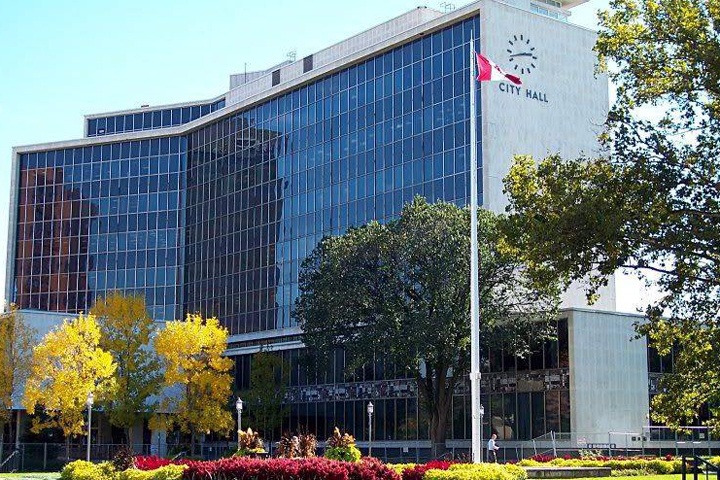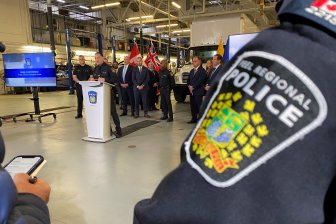Hamilton residents who have questions about the new coronavirus disease, COVID-19, will have a chance to get some answers Wednesday night.

The City of Hamilton is holding another virtual town hall meeting starting at 7 p.m.
The town hall will include Hamilton Mayor Fred Eisenberger, the city’s medical officer of health Dr. Elizabeth Richardson, and the director of the city’s emergency operations centre, Paul Johnson.
Residents can submit questions on the city’s website at hamilton.ca/askcovidquestions and via its Twitter account, @cityofhamilton.
The town hall will be broadcast live on 900 CHML and streamed live on the City of Hamilton’s YouTube channel.
Since the city’s last town hall the overall number of cases of COVID-19 in Hamilton topped 500 as of Wednesday, with 495 positive cases of the coronavirus and five probable.
There have now been 25 deaths connected to COVID-19 in Hamilton, according to public health.
Earlier this week, Hamilton saw its overall number of cases shrink after public health subtracted a number of “false positive” tests from its case count after re-testing samples from a number of locations across the city.
The city’s medical officer said 18 false-positive tests were recorded on Friday. Ten of the results were tied to individuals at Macassa Lodge long-term care home which have now been deemed negative after re-testing.
Dr. Elizabeth Richardson said the other eight false positives include three people at Heritage Green, three at Wentworth Lodge, one at St. Elizabeth’s Village and one at First Place Retirement Living on King Street East.
Samples from all eight of the latter have been re-tested and are now deemed negative for the new coronavirus.
Richardson says testing of all residents and staff in Hamilton’s long-term care facilities should be completed by Friday. Ninety-six per cent of tests ordered by the province have now been completed.
As of Tuesday, the city has 11 outbreaks at nine long-term care homes (Arbour Creek, Blackadar Continuing Care, Dundurn Place Care Centre, Extendicare Hamilton, Grace Villa, Heritage Green, Idlewyld Manor, Regina Gardens, and Wentworth Lodge) and two retirement residences (The Rosslyn, and The Village of Wentworth Heights).
Public health says the outbreak at I.H. Mission Services is over after being first reported on May 2.
On Wednesday, the Hamilton Conservation Authority began a gradual reopening of its natural areas including Christie Lake, Dundas Valley, Eramosa Karst, Fifty Point, Fletcher Creek, Valens Lake and Westfield Heritage Village for “passive recreation” including hiking, biking and bird-watching.
Waterfall and escarpment areas are not included due to narrow trails and other challenges related to physical distancing.
The future of Wild Waterworks summer season is up in the air after a staff report warned of $2.63 million loss if the water park was prepared and staffed for the summer because of a number of risks associated with COVID-19.
Meanwhile, a motion from a downtown Hamilton councillor could lead to the creation of “outdoor dining districts” throughout the city when the Province of Ontario eases coronavirus safety measures and allows restaurants to open back up.
Ward 2 councillor Jason Farr likened the dining spaces to “outdoor food courts” situated near clusters of restaurants that would allow for customers to dine in a larger space that allows for physical distancing.
Questions about COVID-19? Here are some things you need to know:
Health officials caution against all international travel. Returning travellers are legally obligated to self-isolate for 14 days, beginning March 26, in case they develop symptoms and to prevent spreading the virus to others. Some provinces and territories have also implemented additional recommendations or enforcement measures to ensure those returning to the area self-isolate.
Symptoms can include fever, cough and difficulty breathing — very similar to a cold or flu. Some people can develop a more severe illness. People most at risk of this include older adults and people with severe chronic medical conditions like heart, lung or kidney disease. If you develop symptoms, contact public health authorities.
To prevent the virus from spreading, experts recommend frequent handwashing and coughing into your sleeve. They also recommend minimizing contact with others, staying home as much as possible and maintaining a distance of two metres from other people if you go out.
For full COVID-19 coverage from Global News, click here.













Comments